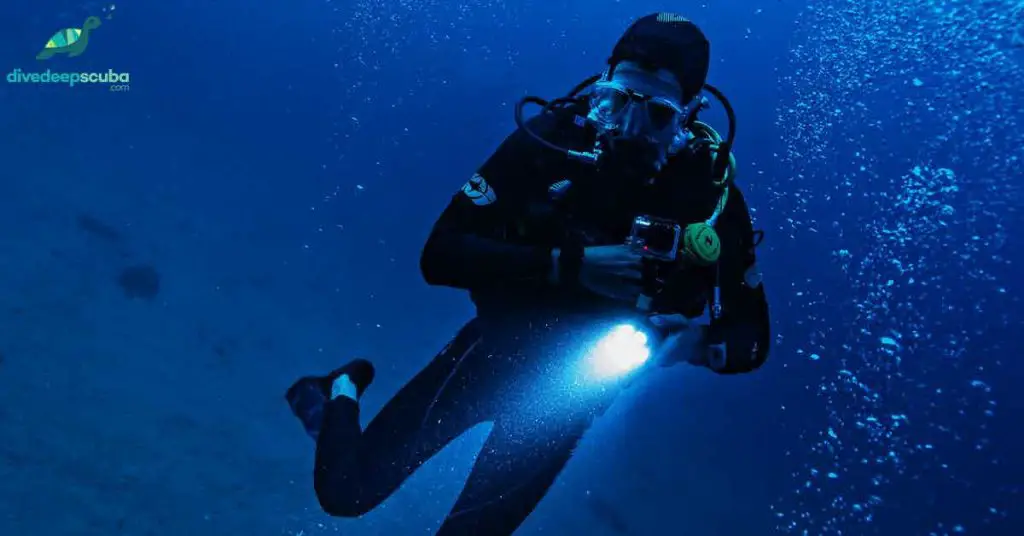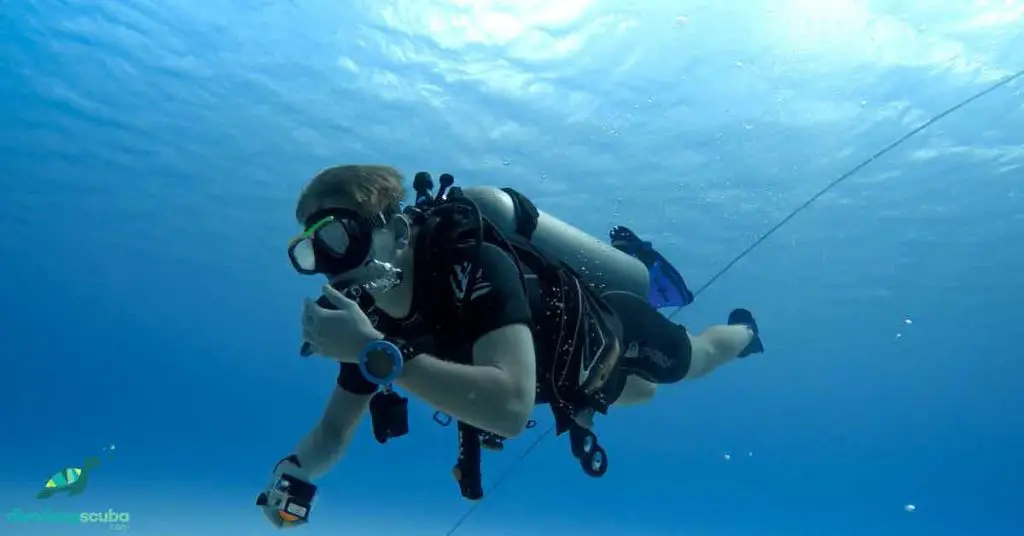Is Scuba Diving a Good Workout?
Scuba diving is a portal into an exciting, mesmerizing, and awe-inspiring world. It’s a gateway to a milieu that enriches and heightens your understanding of nature and sensitivity to the environment.
You also get to see creatures that seem mythical and magical. It is so much fun!
But, is Scuba Diving a Good Workout? In short, yes it is. It is a brilliant, zero impact, muscular and cardiovascular workout. Using fins helps you work out your ankles, calves, hip flexors, quads. Scuba diving also increases our calorific expenditure. Ocean waters are significantly colder than body temperature, meaning your body uses more energy to keep you at 37ºC.
In this article, we will explore if it helps or if you should simply content yourself with the thrill that comes from plunging into and plumbing the depths!
Let’s dive right in. (Pun definitely intended!)
Are You Working out When You Scuba Dive?
Most people don’t get scuba certification for the health benefits!
Truth be told, when you plunge into the depths, calories, callisthenics, cardio and stuff like that are often the last things on your mind.
You know they’re vital. But, they don’t signify underwater because the world you’re immersed in is so wondrous and captivating.
It’s as if you’re on another planet, one that’s brimming with spectacular species and sights.
And yet, it turns out that Scuba diving is an awesome workout.
You burn calories while having fun. At first blush, it seems like a surprising and splendid side-effect! But, as you think about it, it’s not really surprising.
Think about it: divers carry gears on their backs and swim (even if their movements seem kinda slow-mo). Carrying some stuff on your back while you swim is a form of working out if you ask me.
Consider that the gears often weigh between 50 pounds to 70 pounds!
Are you catching my drift? Great. But, what’s the nature of the workout and its effects on the body?

How Effective is Scuba Diving as a Workout?
You probably know that Scuba diving is actually a sport. You do, right?
Of course, it’s not as physically demanding as most sports that readily come to mind. And, competition is hardly the motivation when folks put on fins. The key drivers for most divers are exploration and relaxation.
And yet, after diving, you would have burned calories, have a better appetite, and sleep well, even though you haven’t engaged in any frenetic activity.
It’s awesome!
Especially if you are not a gym rat. I don’t know about you, but I’d rather combine workouts and fun.
When divers navigate the depths, they move their whole body and contend with water resistance, which helps to keep their heart rate up.
Diving improves blood circulation, builds endurance, improves muscle strength and flexibility, and has a positive effect on cardiovascular fitness.
Interestingly, it’s also known to reduce blood pressure and stress, it helps you lose weight and your heart and lungs become healthier.
It’s a full-body workout because you’re virtually using your whole body. So, it’s a good workout.
Indeed, diving is not as physically demanding as most other sports, but it exerts a substantial tax on the body. In fact, the American College of Sports Medicine says the demands are significant enough and should be treated with caution.
So, if a person is obese or has a preexisting health challenge, they ought to see a doctor before they get started diving.
I mustn’t leave you with the wrong impression. Diving can be an intense workout.
It depends on the type of diving and the diver’s desires.
A dude that loves swimming against the currents and one that loves taking life easy won’t get the same workout, right?
You might be wondering how does diving compare to some other sports in terms of its value as a workout?
You’re in luck because a 2011 Compendium of Physical Activities gives scuba diving a ranking of MET 7.0. What the heck is that? Metabolic equivalents. It’s a measure of the rate at which a person expends energy relative to their mass (weight).
In terms of metabolic activity, the Compendium placed it on the same level as football, brisk walking, and ice skating.
What of its effect on calories?
A diver who weighs about 180 pounds would lose an average of 600 calories in an hour of diving.
Wow.
We’ve looked at some salient points above. Let’s wrap up by considering why diving is effective as a workout.

Why is Scuba Diving an Effective Workout?
First, a lot of the muscles in the body are at work when you dive. The muscles in the arms are about the only ones that aren’t so actively engaged.
So, your muscles are being toned as you “play fish.”
Your fins help you work out your ankles, calves, hip flexors, quads… And, it’s being done safely. Unless you’re in danger, there’s never any need for exaggerated muscular movements that could cause muscle damage! In fact, it’s a workout that’s fun.
Secondly, the high calorific burn rate is because we lose heat at a faster rate underwater than on land. It’s actually 25 times faster!
So while you dive, your body is working hard to maintain your ideal body temperature. It’s expending a lot of energy to do this. This is why there’s a high loss of calories when you dive.
The rate at which the body is trying to maintain homeostasis would vary from person to person, location to location. And it is also a function of the kind of diving that is being done.
On average, the body uses about 70% of its daily calorific allocation to keep warm. Naturally, a higher percentage is used up when you’re diving.
Thirdly, water is a dense medium. In fact, it’s 100 times denser than air. So, the diver experiences some form of resistance as they swim. Perhaps I should say as you swim with a heavy load strapped to their backs.
So, it is a tad arduous to carry a dive cylinder that is about 30 pounds to 50 pounds behind you as you explore the depths. Also, consider that the deeper you go into the depths, the higher the water resistance. In fact, it doubles every additional 10 meters downward.
Lastly, at the risk of stating the obvious, divers are compelled to rely on artificial breathing equipment. Interestingly, this helps improve their health.
How?
It turns out that most of us do not really know how to breathe very well.
We are shallow breathers.
While divers are underwater, they have deeper breathing. That suffuses their body with more oxygen and hence energy. It is believed that lung efficiency is ultimately improved.
Don’t Forget Your Dive Insurance!
Before you go out on any dive trip or holiday, it is essential to make sure you have insurance that covers you if something goes wrong. Check out our dive insurance article for more information.
Or go straight to these dive insurance company websites:
If you liked this article, please follow us on Instagram, Twitter and like our Facebook page
What have we Learnt?
Scuba diving is an enthralling sport that transports you to an ethereal realm underwater. In the preceding paragraphs, we checked out its fitness as a workout. We got clued-in to its incredible value.
We also found out why it is awesome, as a workout, and the degree of its effectiveness.
We looked at factors such as water resistance, metabolic rate, the fact that divers carry heavy gears, the body’s quest for homeostasis, and breathing underwater.
It turns out that in terms of metabolic activity, it’s on par with football, ice skating, and brisk walking. In fact, it could extract a substantial energy tax on the body.
It offers many benefits as a workout, and it is fun to boot. But, if you are obese or have a health challenge, I would suggest you see a Dr before you think of diving into the depths.
Yes, Scuba diving is a good workout. But it is not meant to be a replacement for others that could also enhance your health.
Please share this article using the social media buttons!
Is Scuba Diving a Good Workout? FAQs
Is Scuba Diving a Good Workout?
Yes, it is both a good muscular and aerobic workout. Using fins to swim strengthens your ankles, calves, hip flexors, quads. It is an ultra-low impact, sustained aerobic workout that also helps burn more calories.
Why is Scuba Diving Good Exercise
Ocean temperatures are lower than body temperature so your body works hard to keep it at 37ºC. Also, water is more dense than air so diving requires more energy output than above water exercises.
